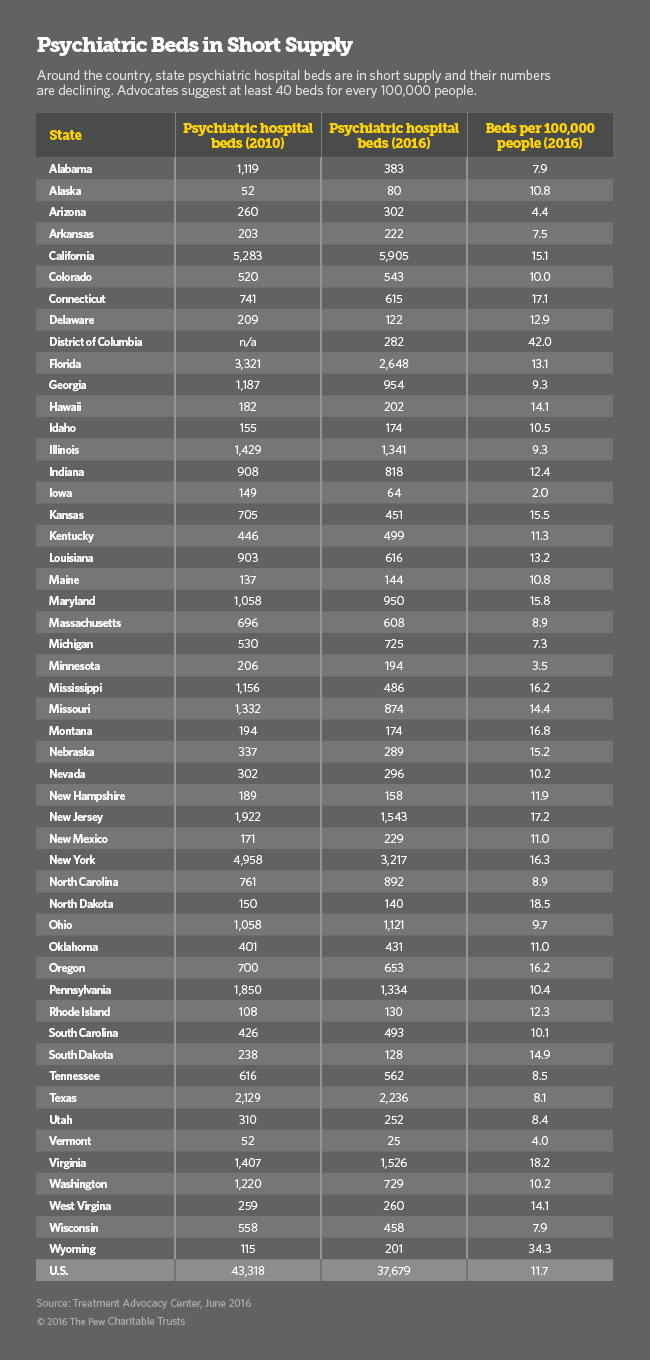Connecting state and local government leaders
The number of state psychiatric beds has dropped from nearly 560,000 in 1955 to 37,679 in 2016.
This article was originally published at Stateline, an initiative of The Pew Charitable Trusts, and was written by Michael Ollove.
Across the country, a critical shortage of state psychiatric beds is forcing mentally ill patients with severe symptoms to be held in emergency rooms, hospitals and jails while they wait for a bed, sometimes for weeks.
Mental health advocates, attorneys and judges say the practice, known as psychiatric boarding, prevents patients from getting the care they need. Instead, such patients are sometimes strapped down or held in isolation, and often receive little or no mental health services.
Several states are moving to increase the number of beds, and to increase crisis services — to help keep a mentally ill person from spiraling out of self-control and ending up in emergency rooms and jails.
But the problem, which many blame on budget cuts and a shortage of psychiatrists and nurses, won’t be easy to solve. By one count, the nation needs an additional 123,300 psychiatric hospital beds.
The crisis is drawing particular scrutiny in Washington state, where two court rulings — one in the state Supreme Court in 2014 and the other in federal court last year — determined that it is illegal for the state to warehouse mentally ill patients and prisoners in emergency rooms, jails and regular hospitals.
The state reacted swiftly, increasing the number of psychiatric beds and boosting spending on community mental health services.
But the courts are impatient with the pace of state action. Last month the federal judge who ruled that the Washington Department of Social and Health Services was violating the constitutional rights of prisoners held the department in contempt and ordered it to pay fines of $500 a day for each inmate waiting more than a week for a bed and $1,000 a day for each inmate waiting more than two weeks for a bed, until the problem is fixed.
The problem extends far beyond Washington: In a 2014 survey, 19 of 38 state mental health directors said their states had been threatened with or found in contempt for failing to admit jailed inmates found mentally incompetent into mental health facilities in a timely manner.
The U.S. now has 37,679 state psychiatric beds, down about 13 percent since 2010, according to a June report from the Treatment Advocacy Center, a nonprofit working to improve treatment for severe mental illness.
The loss of those beds has left “the sickest of the sick” without treatment, said John Snook, the center’s executive director.

The Promise of Deinstitutionalization
The introduction of effective psychiatric medicines and a growing preference to keep the mentally ill close to home and in less restrictive settings led to a steady decline in the number of state psychiatric beds, which peaked at nearly 560,000 in 1955.
Mental health advocates assumed public spending on community mental health would rise as institutions closed, but the increases have fallen short of the need. The recession made the situation worse: States cut $4.35 billion in public mental health spending between 2009 and 2012, though some states have made modest increases since 2012.
“It’s not like the patients have gone away. It’s the treatment resources that have gone away,” said Renée Binder, the immediate past president of the American Psychiatric Association.
Failure to treat severe mental illness can result in worsening symptoms and increase the likelihood that inpatient services will be needed, mental health advocates say.
“Fewer beds and no more community services is a lethal combination,” said Ron Honberg, a senior policy adviser at the National Alliance on Mental Illness.
Yearslong Shortage
Many states have faced shortages of psychiatric beds for years.
A 2008 report for the U.S. Department of Health and Human Services found that psychiatric boarding was routine in many states, including California, Connecticut, Georgia, Maryland, Massachusetts and Nevada. One 2012 study found that 70 percent of emergency rooms had had to board psychiatric patients for more than 24 hours and 10 percent for a week or more.
The Treatment Advocacy Center recommends 40 to 60 psychiatric beds for every 100,000 people. The national average is 11.7, and the group estimates that the country needs an additional 123,300 state psychiatric beds, though it is urging the federal government to do its own assessment.
Georgia has 9.3 beds for every 100,000 people, and 233 fewer beds than it did in 2016. The state has boosted mental health crisis services, but lacks the manpower to prevent the mentally ill from ending up in emergency rooms and hospitals, said Andrew Johnson, a spokesman for the Department of Behavioral Health and Developmental Disabilities.
“We would probably be able to bring more beds on line but for a workforce challenge,” Johnson said. “The shortage of psychiatrists and nurses is our No. 1 problem.”
South Carolina, which has 493 state hospital beds, 67 more than in 2010, has increased mental health spending under Republican Gov. Nikki Haley. Most of the new money has gone toward crisis intervention and services to stabilize patients during an emergency, said Tracy LaPointe, a spokeswoman for the South Carolina Department of Mental Health. LaPointe said the psychiatric boarding continues because there aren’t enough beds.
Several states, including Georgia and Virginia, have or are building online registries that can identify open psychiatric beds using up-to-date information.
Virginia launched its online registry after several high-profile incidents, including the 2013 stabbing of a state senator by his son, who then shot himself to death, all after an open psychiatric bed could not be found. A January report by the state’s inspector general found the registry’s information wasn’t being updated in a timely fashion.
An Imminent Risk
In Washington state, the number of state psychiatric beds declined 40 percent from 2010 to 2016, leaving just 729 beds — or 10.2 beds for every 100,000 people.
During some of this time, the state reduced its spending on mental health, which mental health advocates say increases the need for inpatient beds even as those beds are evaporating.
In the case that reached the state Supreme Court, 10 people were deemed an imminent risk to themselves or others as a result of a mental disorder. Under state law, they should have been sent to state-contracted evaluation, stabilization and treatment centers within 72 hours, where doctors would determine if they needed to be committed.
But, because there was no room at the centers or at state psychiatric facilities, the patients were held for much longer in emergency rooms or acute care hospitals — weeks, in some cases.
“Hospital emergency departments are a uniquely inappropriate place for someone in psychiatric crisis,” said Eric Neiman, who represented two hospital systems that took the case to court. “It’s loud, chaotic, and they don’t have psychiatric professionals.”

NEXT STORY: Cuomo Moves to Block Sex Offenders in N.Y. From Using ‘Pokemon Go’



